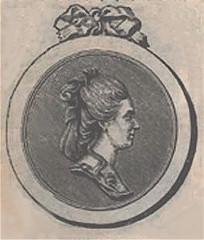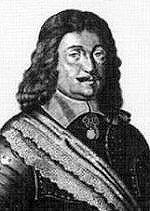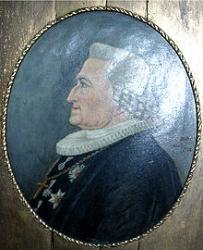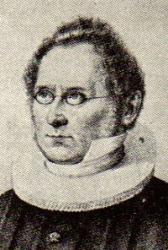Planning worship?
Check out our sister site, ZeteoSearch.org,
for 20+ additional resources related to your search.
- |
User Links
Person Results
‹ Return to hymnal




Export as CSV
Leopold Franz Friedrich Lehr
1709 - 1744 Person Name: Leop. Lehr Hymnal Number: 511 Author of "O kom dog hver, som Synd har gjort" in Salmebog for Lutherske Kristne i Amerika Lehr, Leopold Franz Friedrich, son of Johann Jakob Lehr, Hofrath at Cronenburg (Cronberg, Kronberg), near Frankfurt-am-Main, was born at Cronenburg, Sept. 3, 1709, and entered the University of Jena in 1729, In 1730 he went to Halle to study under J. J. Rambach and G. A. Francke; and here he also acted as tutor to the children of J. A. Freylinghausen, and conducted devotional meetings at the Orphanage. In July 1731 he became a tutor at Cöthen (Köthen) to the princesses of Anhalt-Cöthen, and held this post till 1740, when he was appointed diaconus of the Lutheran church at Cöthen. While on a visit to his father-in-law at Magdeburg he was seized with fever, and died there, Jan. 26, 1744. (Koch, vi. 446, &c.)
Lehr's hymns are full of love to Christ and of the wonders of the redeeming grace of God. They are allied to those of Allendorf (q.v.), and were also mostly contributed to the Cöthnische Lieder (p. 50, ii.). of which he was joint editor. In 1757 they were edited along with his other poetical works as his Himlisches Vergnügen in Gott und Christo, Halle, 1757. [Wernigerode Library] by Samuel Helmich, then court preacher at Glückstadt, Holstein, who had married Lehr's widow.
Those which have passed into English are:—
i. Mein Heiland nimmt die Sünder an. Lent, or The Friend of Sinners. Written in 1731 or 1732 as a companion to the hymn "Jesus nimmt die Sünder an" [see Neumeister]. First published in the Einige geistreiche Lieder, Cöthen, 1733, No. 9, in 11 stanzas of 10 lines, entitled "Luke xv. 2. This Jesus receiveth sinners and eateth with them." Included in J. J. Rambach's Haus Gesang-Buch 1735, No. 264, the Berlin Geistlicher Lieder Schatz, ed. 1863, No. 114, &c. The translations are:—
(1) "My Saviour sinners doth receive, Whom with sin's." This is No. 217 in the Moravian Hymn Book, 1789. In the ed. of 1886, No. 258 begins with st. viii., "Come, all that heavy laden are." (2.) "My Saviour sinners doth receive, Whom under burden," by Dr. John Ker in the United Presbyterian Juvenile Missionary Magazine, May, 1858.
ii. So hab' ich nun den Pels erreichet. The Rock of Ages. 1733 as above, No. 4, in 6 stanzas of 10 lines, entitled " Is. xxvi. 4. The Lord is a rock for ever " (so Luther's version). In Rambach's Haus Gesang-Buch, 1735, No. 303, and the Berlin Geistlicher Lieder Schatz. ed. 1863. The translations are:—
(1) "I now have found the Rock of Ages," by Dr. H. Mills, 1845 (1856, p. 84). (2) "I have at last attained the Rock," by Mitt Warner, 1869, p. 34.
iii. Was hinket ihr, betrogne Seelen. Confirmation. An exhortation to true and whole-hearted earnestness, founded on 1 Kings xviii. 21. 1733 as above, No. 1, in 12 stanzas of 6 lines, and the refrain "Hindurch." In J. J. Rambach's Haus Gesang-Buch, 1735, No. 338, and the Unverfälschter Liedersegen 1851, No. 345. Translated as:—
“Why haltest thus, deluded heart," by Miss Winkworth, 1855, p. 142 (1856, p. 143, beginning "Why halt thus, O deluded heart"). [Rev. James Mearns, M.A.]
--John Julian, Dictionary of Hymnology (1907)
Leopold Franz Friedrich Lehr
Johann Eusebius Schmidt
1670 - 1745 Person Name: Joh. Schmidt Hymnal Number: 700 Author of "Far dog fort" in Salmebog for Lutherske Kristne i Amerika Schmidt, Johann Eusebius, son of Johann Jakob Schmidt, pastor at Hohenfelden, near Erfurt, was born at Hohenfelden, Jan. 12, 1670. He matriculated at the University of Jena in the autumn of 1688, and in 1691 went to Erfurt to attend lectures by Breithaupt and Francke. Part of 1692 he spent in travelling in North Germany, and during the years 1693-96 he was mostly employed in private tuition at Gotha. On the 12th Sunday after Trinity, 1697, he began work at Siebleben, near Gotha, as substitute (curate in charge), and on the 4th Sunday in Advent, 1698, as pastor there. He died at Siebleben, Dec. 25, 1745, with the character of "An edifying teacher in his parish, a good example to his flock, and a methodical man in his office." (G. G. Brückner's Kirchen und Schulenstaat, vol. iii. pt. iv. p. 59, Gotha, 1761, &c).
Schmidt's hymns were contributed to Freylinghausen's Geistreiches Gesang-Buch, 1704, and Neues Geistreiches Gesang-Buch, 1714. In the latter Freylinghausen prints as a supplement (Zugabe) 17 so-called "Psalms for Festivals," being compositions in Ode or Psalm form and unrhymed, remarking in his preface that the author of these (i.e. Schmidt), had written similar compositions for all the Sundays in the year. Of his hymns in rhyme (4, 1st pub. 1704; 21, 1st pub. 1714), some have attained considerable popularity, being of moderate length, good in style, thoughtful and interesting.
Of Schmidt's hymns those which have passed into English are:—
i. Es ist vollbracht: vergissja nicht. Passiontide. This hymn on “It is finished," first appeared in 1714 as above, No. 72, in 5 stanzas of 5 lines. Included as No. 96 in the Unverf älschter Liedersegen, 1851. The translations in common use are:—
1. All is fulfill'd--my heart, record. By A. T. Russell, omitting st. iv., vi., as No. 100 in his Psalms & Hymns, 1851.
2. 'Tis finished : 0 glorious word. A full but rather free translation by Dr. Kennedy, in his Hymnologia Christiana, 1863, repeated, omitting st. ii., vi., in Reid's Praise Book, 1872.
ii. Erhebe den Herren, der Alles in Allen. Thanksgiving. First published 1714 as above, No. 560, in 4 st. of 8 1. Included in Knapp's Evangelischer Lieder-Schatz, 1837 and 1865. Translated as, "The praises of him who is Grace's Dispenser." This is No. 550 in pt. i. of the Moravian Hymn Book, 1751.
iii. Fahre fort, fahre fort. Faithfulness. Founded on Christ's Messages to the Seven Churches in Asia. First published 1704 as above, No. 667, in 7 stanzas of 7 lines. In the Unverfälschter Liedersegen. 1851, No. 223. The translations are:—
(1) "Hasten on, hasten on," by Miss Burlingham, In the British Herald, Sept. 1865, p. 143, and Reid's Praise Book, 1872. (2) "Hold thy course," by E. Massie, 1867, p. 31. (3) "Onward go, onward go," by N. L. Frothingham, 1870, p. 238.
iv. Gekreuzigter! mein Herze sucht. Passiontide. First published 1714 as above, No. 73, in 6 st. of 6 1. In Burg's Gesang-Buch, Breslau, 1746, No. 483. The translations are:—
(l) "Christ crucify'd! my Soul by Faith Desires," in the Supp. to German Psalmody, ed. 1765, p. 23. (2) "Christ crucify'd, my soul by faith, With," as No. 424, based on the earlier tr., in the Moravian Hymn Book, 1789 (1886, No. 959).
v. 0 Jesu der du dich. Easter. First published 1704 as above, No. 651, in 5 st. of 61., repeated in the Herrnhut Gesang-Buch 1735, No. 123. Translated as "0 Jesu, who now free," as No. 552 in pt. i. of the Moravian Hymn Book, 1754. [Rev. James Mearns, M.A.]
-- John Julian, Dictionary of Hymnology (1907)
Johann Eusebius Schmidt
Birgitte K. Boye

1742 - 1824 Person Name: Birgitte Boye Hymnal Number: 20 Author of "O Lue fra Guds Kjærlighed" in Salmebog for Lutherske Kristne i Amerika Birgitte was born on March 7, 1742, in Gentofte, Denmark. She was the daughter of Jens Johansen. Boye married a supreme court judge in Copenhagen, Denmark. She found time to study German, French and English and translated hymns into Danish from these languages. As a hymnist, she was involved with Guldbergs og Harboes Psalmebog (Ove Guldberg’s and Ludvig Harboe’s Psalter), to which she contributed 146 hymns. She also produced "national dramatic writing." She died on October 17, 1824.
Sources: Julian, p. 1001 & Stulken, p. 145
Birgitte K. Boye
Wilhelm II

1598 - 1662 Person Name: Hertug Wilhelm 2 Hymnal Number: 5 Translator of "O Herre Krist, dig til os vend " in Salmebog for Lutherske Kristne i Amerika Wilhelm (II. or IV.), Duke of Sachse-Weimar, son of Duke Johann of Sachse-Weimar, was born in the castle of Altenburg, April 11, 1598. He studied for some time at the University of Jena, devoting himself especially to music and mathematics. On the outbreak of the Thirty Years War he espoused the cause of Friedrich V. of the Palatinate. At the battle of the Weisse Berg, near Prague, he was severely wounded, and at the battle fought near Stadtlohn, in Westphalia (Aug., 1623), he was at first left for dead, and then taken prisoner by Tilly. In 1625 the Emperor allowed him to go free, and he assumed the government of Weimar. When Gustavus Adolphus came to Germany (1630), Wilhelm did not join him till after the battle of Breitenfeld (Sept., 1631), and in July, 1635, he was one of the consenting parties to the Peace of Prague between Saxony and the Emperor, in consequence of which the Swedish troops made various inroads on his territory. When the final partition took place, in 1644, between himself and his surviving brother (Sachse-Weimar fell to Wilhelm, and Gotha to Ernst) he set himself earnestly to restore prosperity and godliness in the regions under his rule. He also found more time (especially after the peace of Westphalia, 1648), to devote to his studies in poetry and music, and to the adornment of Weimar. He died at Weimar, May 17, 1662 (Koch, iii. 110; Wetzel, iii. 426; Bode, p. 172, &c).
Wilhelm joined, in 1617, in founding the Fruitbearing Society, the great German Literary and Patriotic Union of the 17th century; and, after the death (1650) of Ludwig, Prince of Anhalt-Cöthen, became its head. Weimar thus became the centre of its operations, in the direction of which the Duke was assisted by Georg Neumark. Neumark, in his Palmbaum, 1680, p. 449, speaks of the Duke as having "composed several hymns, as well-known in this place, especially the short Hymn of Peace ‘Gott der Friede hat gegeben.'"
Besides this hymn on Peace only one other is known as Wilhelm's, viz.:—
Herr Jesu Christ, dich zu uns wend . Public Worship. This was included as No. 124 in the 2nd edition, 1651, of pt. i. of the Cantionale Sacrum, Gotha (1st ed. 1646), in 4 stanzas of 4 lines, entitled "To be sung before the Sermon." As no author's name is there given, and as it did not appear in any of the three parts of the original edition of 1646-48, the Duke's authorship is decidedly doubtful. So far as yet traced the Duke's name was not attached to it until in the Altdorf Liederfreud of 1676 (Fischer's Supplement, p. 71). In J. Niedling's Handbüchlein, 4th ed., 1655, p. 746, it appears without author's name (Niedling, be it observed, was living at Altenburg), and entitled "A heartfelt petition of pious Christians for grace and the help of the Holy Spirit, during Divine Service, before the Sermon." Koch says it was in the first edition, 1638, of Niedling, but this appears to be merely a guess, for the earliest edition of Niedling which he describes at iii., 109, is that of 1655; and if it were in Niedling's 1638 ed., this circumstance would make the Duke's authorship still more unlikely. Whoever the author was the hymn soon became justly popular, and in 1678 was formally directed to be sung in all the churches in Saxony on all Sundays and festivals. It is a simple and forcible hymn, which survived the Rationalistic period, and is found in all recent German hymn-books, e.g. in the Berlin Geistliche Lieder, ed. 1863, No. 356. Translated as:—
1. Lord Christ, reveal Thy holy Face. In full by J. C. Jacobi, in his Psalter Germanica, 1722, p. 42 (1732, p. 69). Repeated as No. 322 in pt. i. of the Moravian Hymn Book, 1754 (1886, No. 724), and as No. 54 in J. F. Thrupp's Psalms & Hymns, 1853.
2. Lord Jesu, to our prayer attend. This is a good and full translation by A. T. Russell, as No. 12 in his Psalms & Hymns, 1851.
3. Lord Jesus Christ, be present now! This is a good and full translation by Miss Winkworth, as No. 13 in her Chorale Book for England, 1863; repeated in the Pennsylvania Lutheran Church Book, 1868, No. 49.
4. Christ Jesus Lord, to us attend. In full by L. Heyl, as No. 3 in the Ohio Lutheran Hymnal, 1880.
Other translations are:—
(1) "Lord Jesus, turn to us, and down," by Dr. G. Walker, 1860, p. 48. (2) "Lord Jesus Christ, in mercy bend," by Miss Manington, 1863, p. 19. (3) "Lord Jesus Christ, now towards us bend," by N. L. Frothingham, 1870, p. 221. [Rev. James Mearns, M.A.]
-- John Julian, Dictionary of Hymnology (1907)
Wilhelm II
Christoph Knoll
1563 - 1650 Person Name: Krist. Knoll Hymnal Number: 618 Author of "Mig hjertelig nu længes" in Salmebog for Lutherske Kristne i Amerika Knoll, Christoph, was born in 1563 at Bunzlau in Silesia, and entered the University of Frankfurt a. Oder in 1583. In 1586 he was appointed assistant (Signator) in the school at Sprottau in Silesia. He then became, in 1591, diaconus, and in 1620 archidiaconus, at Sprottau. On Nov. 23, 1628, he was ex¬pelled by the Lichtenstein dragoons, but was eventually allowed to become pastor at the neighbouring village of Wittgendorf, where he died in 1650 (S. J. Ehrhardt's Presbyterologie Schlesiens, 1780-89, iii. pp. 386, 505, &c). His well-known hymn:
Herzlich thut mich verlangen. For the Dying, is said to have been written during a pestilence in 1599, and was first printed at Gorlitz in 1605 (see Blatter für Hymnologie, 1887, pp. 8, 56, &c). In Wackernagel, v. p. 350 (from Buchwalder's Gesange-Buch, Görlitz, 1611, &c.) the Unverfälschter Liedersegen 1851, No. 822, &c, in 11 stanzas of 8 lines. Translated as "My heart is filled with longing," by Miss Winkworth in her Chorale Book for England, 1863, Appx. No. iv. [Rev. James Mearns, M.A.]
--John Julian, Dictionary of Hymnology (1907)
Christoph Knoll
H. A. Timm
1800 - 1866 Person Name: Herman Timm Hymnal Number: 376 Author of "Bliv hos mig, kjære Herre Krist!" in Salmebog for Lutherske Kristne i Amerika Herman Andreas Timm born 28 October 1800. Death 4 november 1866 in Magleby on Amager, where he served as a priest. Psalm Author represented in the Danish Psalmebog for Kirke go Hjem.
https://sv.wikipedia.org/wiki/Herman_Andreas_Timm
H. A. Timm
David Denicke
1603 - 1680 Hymnal Number: 371 Author of "O Jesus, Troens dyre Skat" in Salmebog for Lutherske Kristne i Amerika Denicke, David, son of B. D. Denicke, Town Judge of Zittau, Saxony, was born at Zittau, January 31, 1603. After studying philosophy and law at the Universities of Wittenberg and Jena, he was for a time tutor of law at Königsberg, and, 1624-1628, travelled in Holland, England and France. In 1629 he became tutor to the sons of Duke Georg of Brunswick-Lüneburg, and under father and sons held various important offices, such as, 1639, the direction of the foundation of Bursfeld, and in 1642 a member of the Consistory at Hannover. He died at Hannover, April 1, 1680 (Koch, iii. 237; Bode, p. 58). His hymns, which for that time were in good taste, and are simple, useful, warm, and flowing, appeared in the various Hannoverian hymnbooks, 1646-1659, which he edited along with J. Gesenius (q.v.). All appeared there without his name. Those translated are:—i. Wenn ich die heilgen zehn Gebot. Ten Commandments. Contributed to the Hannover Gesang Buch, 1652, No. 69, as a hymn on the Ten Commandments, in 22 stanza of 4 1., stanzas i.-x. being a confession of sins against them, and stanzas xi.-xxii. a medi¬tation and prayer for God's mercy. Included in Crüger's Praxis pietatis melica, 1661, in Freylinghausen's Gesang Buch, 1714, and recently in a few collections, as Sarnighausen's Gesang Buch, 1855, No. 164, and the Ohio Gesang Buch, 1865, No. 182. It is translated as Almighty Lord of earth and heaven. By C. H. L. Schnette, as No. 206 in the Ohio Lutheran Hymnal, 1880. Stanzas i.-iv. are literal; stanzas v.-vii. seem based on v., vii., xvi., xvii.
Hymns not in English common use:—
ii. Ach treuer Gott! ich ruf zu dir . [Christian Life .] 1st published in the Hannover Gesang Buch, 1652, No. 135, in 17 st. This is translated as:—(1) “My God! I call upon Thy name," by Miss Cox, 1841, p. 177. (2) "Most holy God! to thee I cry," by Lady E. Fortescue, 1843 (1847, p. 69).
iii. Kommt, lasst euch den Herren lehren . [ The Beatitudes,] 1st published in the Hannover Gesang Buch , 1648, in 11 st., No. 133. It may have been suggested by J. Heermann's "Kommt ihr Christen, kommt und höret" (9 st. in his Sontags- und Fest-Evangelia, Leipzig, 1638; Mützell, 1858, No. 94), but has only 3 lines in common with it. In the Nürnberg Gesang Buch , 1676, No. 962, and many later hymnbooks, it begins : "kommt und lasst uns Jesum lehren." It is translated as "Come and hear our blessed Saviour," by J. C. Jacobi, 1722, p. 46. In his 2nd edition, 1732, p. 75, altered and beginning “Come, and hear the sacred story," and thence in the Moravian Hymnbook, 1754, pt. i., No. 469; stanzas x., xi. beginning, "Jesus, grant me to inherit," being repeated in later editions and as No. 423 in J. A. Latrobe's Collection, 1841.
iv. Was kann ich doch fiir Dank. [Praise and Thanksgiving] 1st publised in the Hannover Gesang Buch, 1648, in 8 st., No. 154. Stanza vii. is altered from “Herr Jesu, führe mich," by J. Heermann (Devoti Musica Cordis); Breslau, 1630; Mützell, 1858, No. 57. Translated as "What, thanks can I repay?" by J. C. Jacobi, 1725, p. 46 (1732, p. 147).
v. Wir Menschen sein zu dem, O Gott. [Holy Scripture."] 1st published in the Hannover Gesang Buch, 1659, No. 180, in 10 stanzas. Founded on the Gospel for Sexagesima Sunday—St. Luke viii. 4, &c. Translated as:—(1) "Give us Thy Spirit, Lord, that we," a translation of stanza iii. by J. Swertner, as No. 8 in the Moravian Hymnbook, 1789 (1886, No. 9). (2) "Let the splendour of Thy word," a translation of stanza ix. by J. Swertner, as No. 15, in the Moravian Hymnbook, 1789. (1886, No. 17). [Rev. James Mearns, M.A.]
-- John Julian, Dictionary of Hymnology
David Denicke
Johan Nordahl Brun

1745 - 1816 Person Name: Johan Nordal Brun Hymnal Number: 43 Author of "Lad denne Dag, o Herre Gud" in Salmebog for Lutherske Kristne i Amerika
Johan Nordahl Brun
C. J. Boye

1791 - 1853 Person Name: Casper Boye Hymnal Number: 179 Author of "Saa vidt som Solens Straaler stige" in Salmebog for Lutherske Kristne i Amerika Caspar Johannes Boye was born in Kongsberg, Norway in 1791. He studied both law and theology at the University of Copenhagen, became a teacher and later served as rector in Søllerød, Helsingørand and Copenhagen. He died in 1853.
See also in:
Wikipedia
C. J. Boye
Karl August Döring
1783 - 1844 Person Name: Karl Døring Hymnal Number: 364 Author (v. 1-5) of "Lover den Herre, hvis reddende Kjærlighed sender" in Salmebog for Lutherske Kristne i Amerika Döring, Carl August, son of B. L. Döring, chief forester at Mark-Alvensleben, near Magdeburg, was born at Mark-Alvensleben, Jan. 22, 1783. After completing his studies at the University of Halle, he was for some time private tutor at Waldenburg, in Silesia. In 1808 he was appointed a master in the school at Kloster-Bergen, near Magdeburg; and after its dissolution by Napoleon in 1810, acted for some time as a private tutor at Helmsdorf, near Eisleben. He was, in 1814, appointed afternoon preacher at St. Peter's Church, Magdeburg; in 1815 Archidiaconus of St. Andrew's Church at Eisleben; and in 1816 Pastor of the Lutheran Church at Elberfeld. He died at Elberfeld, Jan 17, 1844 (Koch, vii. 159-168; Allg. Deutsche Biog. , v. 348-349).
One of the most prolific of German hymnwriters, he produced some 1200 hymns, not a few of which have passed into use in Germany through the Berlin Gesang-Buchem, 1829, the Nassau Gesang-Buch, 1844, and other collections. They appeared mostly in his Christliches Hausgesangbuch. Of this pt. i was published at Elberfeld, 1821, with 515 hymns by himself, and 169 by others; the 2nd edition, Elberfeld, 1825, omitting those by other authors, and increasing his own to 630. Part ii was published at Elberfeld, 1830, with 551 hymns. Three have been translated:—
i. Ich weiss, dass mein Erlöser lebt, Er ward ja schon mein Leben! [Easter.] 1821, as above, No. 100, in 6 stansas, translated as “I know that my Redeemer lives; He is my life already," by N. L. Frothingham, 1870, p. 157.
ii. Vater, Sohn and heil'ger Geist. [Confirmation.] 1821, as above (No. 546), as a hymn for Confirmation. It is in 15 stanzas of various metres, st. i.-iii. being marked as to be sung by the congregation on behalf of the children; stanzas viii.-xiii. as a hymn of supplication by the children; stanzas iv.-vii. by the parents and teachers; and stanzas xiv.-xv., by the congregation as a general supplication. Two parts are in German common use, viz. stanzas i.-iii. as Rin Bunsen's Versuch, 1833, No. 614, beginning, "Segne, Vater, Sohn und Geist," as in Döring's edition 1825, No. 502; and stanzas viii.-xiii., beginning, "Wir flehn um deine Gnade," in Bunsen, No. 615, the Hamburg Gesang-Buch, 1842, No. 276, and many recent collections. The only translation in common use is—
Father, Son and Holy Ghost, Bless the Young. A good translation of stanzas i.-iii. by J. S. Stallybrass, in the Tonic Sol-fa Reporter, January, 1859, and thence, as No. 329, in the Scottish Presbyterian Hymnal, 1876.
iii. Taufe mich mit deiner Taufe, [Whitsuntide.] 1821, as above, No. 135, in 4 stanzas. It is translated as "With other baptism, Lord, baptise," by Dr. G. Walker, 1860, p. 66. [Rev. James Mearns, M.A.]
-- John Julian, Dictionary of Hymnology (1907)
Karl August Döring


 My Starred Hymns
My Starred Hymns


